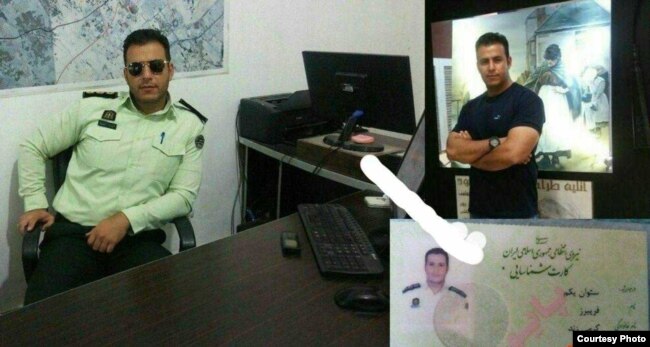VOA – An Iranian police officer has deserted his post and fled Iran, saying his life was in danger for refusing orders to suppress anti-government protests that have swept the country this year.
Fariborz Karamizand, a member of Iran’s ethnic Kurdish minority, spoke to VOA’s Kurdish Service on Thursday. In an exclusive Skype video interview, he said he had deserted his Tehran-based position as a three-star first lieutenant with Iran’s Intelligence and Public Security Police. The force, known as PAVA, is a domestic security branch of Iran’s national police organization, the NAJA.
“I refused to implement an order to crack down on the people and their uprising, and [refused] to arrest those who participated in a legitimate cause,” Karamizand said. “My life was in danger. I had to leave Iran.”
Karamizand said he went into hiding with his family, but he did not disclose which country he fled to or when. He said Iranian police and intelligence agents of Iran’s Islamic Revolutionary Guards Corps were searching for him and his family members.
Karamizand said other security officers recently have abandoned their posts as well. “Just a few days ago, an NAJA officer deserted, and [there have been desertions] even within the army and Revolutionary Guards,” he said. He did not provide further details but said the deserters were “fed up” with what he called the Iranian government’s oppression of its own people.
Karamizand is a native of the predominantly ethnic Kurdish western Iranian province of Kermanshah. He said he had been stationed there for much of his police career, but his superiors transferred him to Tehran earlier this year. He said the transfer was in response to his initial defiance of orders to suppress anti-government protests by Iranian Kurds in Kermanshah.
“The people of Kermanshah played a leading role in the protests, but they were cracked down upon harshly,” he said. “They came under attack from the Iranian security apparatus, including the Revolutionary Guards and Basiji militiamen.”
After being transferred to Tehran, where he was subject to greater bureaucratic oversight than in his previous position in Kermanshah, Karamizand said he again refused to obey commands to crack down on anti-government demonstrations, this time in the Iranian capital.
Karamizand called on other Iranian police officers to side with Iranians seeking to expedite the demise of Iran’s Islamist leadership, which seized power in a 1979 revolution. “Police work is sacred, but its legitimacy is in the hands of the people, not the regime,” he said.
Karamizand also had a message for the Iranian people: “They should not wait for an outside country [to help], they should organize themselves in one city after another and stand up together as civilians, so that security forces do not interfere.”
Iran has seen frequent nationwide protests this year by citizens expressing anger toward local and national officials and business leaders whom they accuse of mismanagement, corruption and oppression. Iranian leaders often have deflected the domestic criticism by blaming the unrest on foreign “enemies.”
This report was produced in collaboration with VOA’s Persian Service.
 Shabtabnews In this dark night, I have lost my way – Arise from a corner, oh you the star of guidance.
Shabtabnews In this dark night, I have lost my way – Arise from a corner, oh you the star of guidance.




